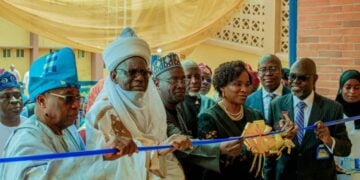In a move that signals a strategic shift towards revitalising agriculture through higher education, the Tertiary Education Trust Fund (TETFund) recently launched an initiative to transform select Nigerian universities into centres of mechanised commercial farming and livestock innovation.
This intervention is not merely about farms, but about planting the seeds of a future where research, technology, and agribusiness collide to drive national growth.
At the heart of this vision is the belief that Nigeria’s agricultural future doesn’t lie solely in its vast arable lands, but in the minds of young scholars and researchers being trained in the nation’s universities.
Recently, the chairman of TETFund Board of Trustees, Hon. Aminu Bello Masari, inaugurated a five-member Evaluation Committee tasked with a critical mission of selecting the first 10 universities to benefit from the 2025 intervention programme focused on establishing mechanised farms and livestock operations.
The selection process, Masari explained, will be rigorous. Only universities of agriculture or those with a strong Faculty of Agriculture will be considered.
These institutions must also own at least 50 hectares of unencumbered land and currently run a functional commercial farm engaged in at least one agricultural value chain.
For the Chairman, this is not about token gestures. It is about setting a new agricultural standard in the tertiary education system.
“Most of the institutions have submitted their Expressions of Interest. It became necessary to constitute this committee to ensure objectivity and transparency in the selection process.”
Chaired by Mr. Ewara E. Bassey, Director of the Federal Department of Agriculture in the Ministry of Agriculture and Food Security, the Evaluation Committee also includes representatives from the Ministry of Education, Ministry of Livestock Development, the National Universities Commission (NUC), the Agricultural Research Council of Nigeria, and TETFund’s own Research and Development/Centres of Excellence Department.
Their assignment is to assess institutional submissions, develop a credible evaluation template, score performance, and recommend qualified universities from across Nigeria’s six geopolitical zones,.all within a two-week deadline.
This committee, Masari emphasised, embodies the Fund’s commitment to fairness, innovation, and national transformation. “The constitution and composition of this committee underscore the importance we place on this project,” he said, urging the members to “work as a team and deliver professionally.”
The project goes beyond establishing farms. It’s a part of a larger vision to bridge the gap between academic research and agricultural productivity. With eight of TETFund’s 27 Centres of Excellence already dedicated to agriculture, the agency is also financing Agricultural Research Laboratories and Demonstration Farms in six universities. These facilities will serve as innovation hubs to improve crop and animal production through research, training, and the application of cutting-edge technologies like automation, precision farming, and data analytics.
“Agriculture provides food security, generates income, and contributes to economic growth, especially in developing countries like ours,” Masari stated. “By promoting agricultural development, we are also promoting inclusive growth and reducing the urban-rural divide.”
For the TETFund Chairman, the significance of this programme goes back to Nigeria’s roots. Before the oil boom, agriculture was the nation’s economic backbone. Today, with global instability and increasing import bills threatening food security, it is once again a strategic sector capable of lifting millions out of poverty and restoring economic self-reliance.
This vision aligns with global trends, where agricultural innovation is reshaping economies. From drone-assisted crop monitoring to AI-driven weather forecasting and automated irrigation systems, the future of farming is digital and TETFund wants Nigerian universities to be ahead of the curve.
Hon. Masari’s speech reflected this sense of urgency and potential. He described agriculture as a cornerstone of national development and said Nigeria’s universities must play a central role in cultivating the next generation of farmers, agro-technologists, and rural entrepreneurs.
“Our mission is clear,” he said. “To reposition Nigerian universities not just as academic centres, but as engines of national economic development.”
Responding on behalf of the newly inaugurated committee, Mr. Bassey expressed gratitude to TETFund for the opportunity to contribute to a national cause. He acknowledged the calibre of professionals on the committee and pledged that they would not only meet their deliverables, but also submit recommendations that could shape the long-term success of the initiative.
The committee’s work will set the stage for a multi-phase rollout, with the first 10 universities acting as pilot sites. If successful, the programme could expand to dozens more institutions, creating a network of innovation-led university farms across Nigeria.
The seeds are being planted—literally and figuratively. With careful selection, rigorous implementation, and a commitment to innovation, TETFund’s agricultural intervention may well become a model for how education can drive transformation in one of Nigeria’s most vital sectors.
It’s a project that goes beyond harvests. It is about equipping universities to nurture the minds and methods that will feed the nation, reduce unemployment, and foster a future where agriculture is not just a fallback, but a force of prosperity.





